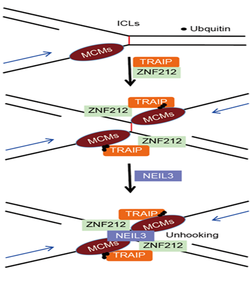
Researchers in Korea have discovered proteins that help repair damaged DNA, raising the possibility of improving the performance of cancer or genetic disease treatments.
Ulsan National Institute of Science and Technology (UNIST) said Thursday that its Professors Kim Hong-tgae and Myong Kyong-jae and Sukmyung University Professor Kim Yong-hwan had found a new protein that combines with an enzyme that plays an important role in path selection in the repairs of DNA binding damage (Integrated Crosslink, ICL).
ICL refers to a phenomenon of covalent bonding between two strands. When ICL occurs, it prevents DNA replication and transcription and causes cutting, inducing cell death. Platinum-based immunotherapy uses a mechanism that induces cancer cell death through ICL.

The researchers took note of TRAIP (TRAF interacting protein), which acts as a regulator to determine binding damage recovery mechanisms in frog egg extracts. To identify TRAIP’s mechanism from human cells, they used Yeast two hybrid and discovered ZNF212, a binding protein. Yeast two hybrid is a research technique that uses yeast to determine the interaction between two proteins.
As a result, they confirmed that the decline in the expression of the ZNF212 protein increases the cell’s chromosome instability while reducing its viability.
In addition, using microradiation techniques, they observed the rapid migration of ZNF212 protein to the DNA damage site along with TRAIP. Microradiation technique is a method that confirms the movement of proteins from living cells to DNA damage sites.
The researchers also confirmed that the ZNF212 protein binds directly to the NEIL3 protein and that the NEIL3 protein plays an important role in moving to the damaged location.
“The recent study found the role of the ZNF212, a new protein engaged in the repairing process of DNA’s ICL that had been not known widely,” Professor Kim Hong-tae said. “It provided a blueprint for follow-up research for future cancer treatment and development of new drugs for genetic diseases.”
The study, “ZNF212 participates in interstrand DNA crosslink repair through direct interaction with TRAIP,” was published online in the Jan. 3 edition of Nucleic Acids Research, a top 2.6 percent journal in biochemistry and molecular biology.














